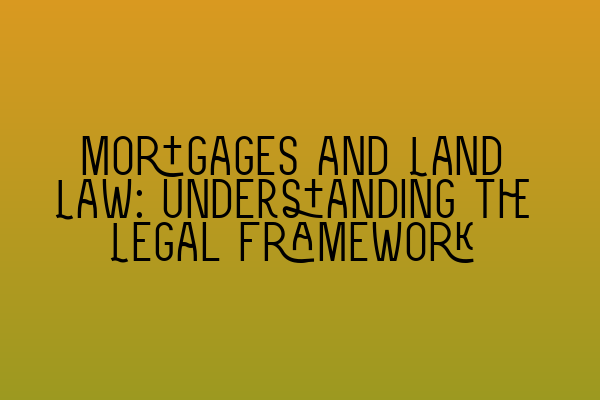Mortgages and Land Law: Understanding the Legal Framework
Welcome to SQE Property Law & Land Law! As solicitors specializing in property law, we are here to guide you through the complex legal framework surrounding mortgages and land law. Whether you are a homeowner, property investor, or just curious about the topic, this blog post will provide you with a comprehensive understanding of the key concepts and principles involved.
Before diving into the details, it’s important to note that the information provided is of a general nature and should not be considered as legal advice. For specific queries or concerns, we recommend consulting with a qualified solicitor.
Now, let’s explore the fascinating world of mortgages and land law!
1. What is a Mortgage?
A mortgage is a legal agreement between a borrower and a lender, usually a bank or building society, that allows the borrower to obtain financing for the purchase of a property. The property itself serves as collateral for the loan, giving the lender the right to take possession of the property if the borrower fails to meet their repayment obligations.
2. Types of Mortgages
There are various types of mortgages available, each with its own terms and conditions. Some common types include fixed-rate mortgages, adjustable-rate mortgages, interest-only mortgages, and buy-to-let mortgages. Choosing the right type of mortgage depends on your individual circumstances and financial goals.
3. Legal Framework for Mortgages
In the United Kingdom, the legal framework for mortgages is primarily governed by land law statutes and case law. The key legislation includes the Law of Property Act 1925, the Land Registration Act 2002, and the Consumer Credit Act 1974. These laws outline the rights and responsibilities of both borrowers and lenders, ensuring a fair and transparent mortgage process.
4. Equity and Mortgages
Equity refers to the value of a property that is owned outright by the homeowner, minus any outstanding mortgage debt. As the homeowner continues to make mortgage payments, their equity gradually increases. This equity can be accessed through various means, such as remortgaging or obtaining a second charge mortgage.
5. Registration and Priority
To protect their interests, lenders register their mortgage charges against the property at the Land Registry. This registration establishes the lender’s priority in the event of any subsequent transactions or claims against the property. It is crucial for borrowers to be aware of the implications of registration and to seek legal advice before entering into any further financial commitments.
6. Foreclosure and Repossession
In the unfortunate event of mortgage default, lenders have the right to initiate foreclosure proceedings and repossess the property. However, this is typically considered a last resort, and lenders are usually willing to explore alternative solutions, such as repayment plans or loan modifications, to avoid foreclosure.
7. Land Law and Conveyancing
Land law plays a significant role in the conveyancing process, which involves the transfer of legal ownership of a property from the seller to the buyer. Solicitors specializing in property law assist both buyers and sellers in ensuring a smooth and legally compliant transaction. Understanding the intricacies of land law is essential to protect your interests and avoid any potential disputes in the future.
In conclusion, mortgages and land law are integral parts of property ownership and investment. By familiarizing yourself with the legal framework surrounding mortgages, you can make informed decisions and safeguard your rights as a homeowner or property investor.
If you’re looking to expand your knowledge further, we recommend checking out our related articles for additional insights:
– Interactive SQE Mock Tests for Contract Law: Test Your Knowledge
– Join Our SQE Contract Law Webinars: Expert Insights and Guidance
– Contract Law Reforms: An Analysis of Recent Changes
– Parties in a Contract: Rights and Responsibilities
– The Importance of Ethics in Contract Law: A Comprehensive Guide
Remember, the information provided in this blog post is for general informational purposes only and should not be considered as legal advice. For personalized advice and guidance, consult with a qualified solicitor specializing in property law.
Stay tuned for more informative content from SQE Property Law & Land Law. Happy reading!
